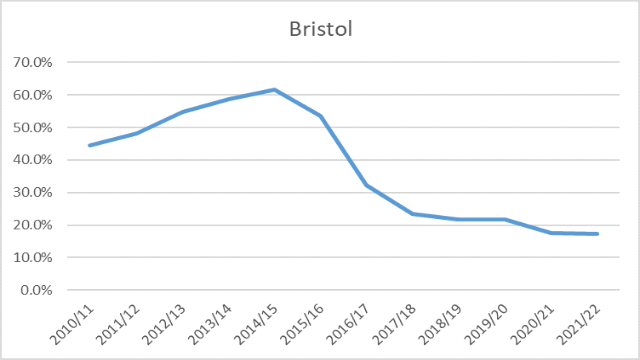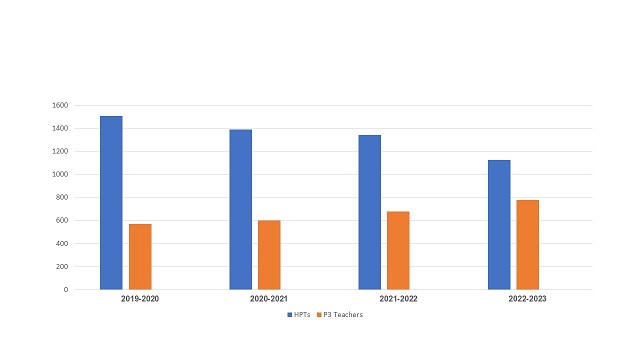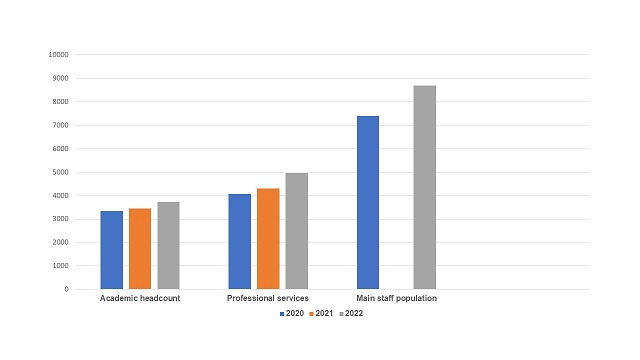Protecting your interests
You make our University the success it is. We’re working hard to protect your interests and benefits.
We continue to listen to your feedback on the issues which affect you, as a valued member of our University. We have been focusing our efforts on a number of key areas which we know are important to you:
- Casualisation
- Workload
- Equity and diversity issues
- Pay and pensions
There is more to do, but we are committed to continuing the progress we have made relating to these areas, and others. Read on to learn about the improvements we’ve been making.
If you have any questions or would like to talk to us about what we’re doing, you can make contact via internal-comms@bristol.ac.uk and your query will be directed to the most appropriate team.
Casualisation
Casualisation in the workplace occurs when permanent roles are replaced by short-term or casual/hourly paid contracts. We have continued to review the balance of open-ended fixed-term and hourly paid contracts across the University against our business needs, resulting in more secure employment opportunities for more colleagues.
Research
As signatories of the Concordat to Support the Career Development of Researchers, we are committed to addressing the challenges around insecurity of employment and career progression of all researchers. Over the last ten-years, as shown in the graph below, Bristol has made significant progress in moving our researchers onto open-ended contracts with fixed funding, going from a peak of 62% of researchers on fixed-term contracts in 2014/15 to 17% in 2021/22.

Figure 1: A chart showing the reduction of researchers on fixed-term contracts.
This is excellent progress, but we recognise that this is only one measure and isn’t the whole solution. Open-ended contracts support our researchers by enabling them to secure mortgages or other financial support, but we are aware that the funding is still fixed so they alone do not improve job security.
The Academic Career Development Programme has focused in more detail on these issues with several projects to support our researchers, including:
- Career development and promotion for Research Associates and Senior Research Associates on Academic Role Profile Levels a and b respectively
- Support for career transition to independence beyond levels a/b through initiatives like Bristol Clear.
- Exploring new ideas for retaining and developing research talent, as well as targeted use of University funds, e.g. piloting a career development fund for researchers
- Further embedding of our academic promotions framework at all stages in the academic career path
- Focus on providing researchers with the skills and development opportunities they need to transfer to core roles, to enable them to make sustainable employment choices. This is further complemented by activities that form part of our research culture programme, including work to ensure professional development time – another key part of the Concordat – is protected and properly resourced.
Teaching
We face different but comparable challenges in supporting staff who are teaching. Since 2019 we have reduced our reliance on hourly-paid teaching staff (Teaching Support Roles) in favour of more certain fixed-term Pathway 3 teaching colleagues.
| TSR | P3 Teachers | |
| 2018-2019 | 1685 | N/A |
| 2019-2020 | 1504 | 568 |
| 2020-2021 | 1388 | 601 |
| 2021-2022 | 1343 | 678 |
| 2022-2023 | 1123 | 777 |

Figure 2: Bar chart showing the reduction in Teaching Support Roles in favour of P3 teaching colleagues.
The overall reduction in hourly-paid Teaching Support Roles across the institution since 2018 is 33%. The increase in P3 teaching colleagues since 2019 is 37%. Of these P3 colleagues, 86% are on open-ended contracts.
HR teams have worked collaboratively with schools, faculties and divisions to review their reliance on hourly paid and casual contracts. We will continue to identify where fixed-term and permanent roles should be created for sustainable teaching delivery and management of workloads.
Workload
Workload remains a challenge across our institution. We know issues around workload are critically important to colleagues, and a significant factor in staff wellbeing. While there is no one-stop solution to workload and it needs to be considered at a local level as well as at University level, we are supporting schools, faculties, and divisions in reviewing their own needs as part of the Integrated Planning Process and ensuring unnecessary bureaucracy is removed.
The University headcount has continued to grow to reflect both the growth in student numbers as well as to recognise where workloads were unsustainable. As an example of improvements at an institution level, we have built capacity into some of our academic and Professional Services teams, where there has been a critical need for more resource.
- Our academic headcount has increased from 3334 in August 2020 to 3448 in August 2021, and to 3722 in November 2022, a total increase of 388 staff.
- Our Professional Services headcount has increased from 4064 to 4301 in 2021 and to 4972 in November 2022, an increase of 908 staff over the same period.
In total, our main staff population (those on open-ended and fixed-term contracts) increased from 7398 to 8694, an additional 1296 colleagues since August 2020.

Figure 3: Bar chart showing the increase in both our academic and Professional Services communities, and total headcount.
We are also undertaking the following to help tackle workload across the University:
- Reviewing process efficiency to identify ways of working which do not add value
- Discussing with trade unions what activities we should stop
- Challenging broader systemic issues through the Integrated Planning Process
- Reviewing the structure of the academic year to identify opportunities to mitigate pressure points in our teaching calendar.
Equity and diversity issues
We have undertaken significant work across the institution to build a diverse and inclusive University community where colleagues from the broadest possible range of backgrounds can reach their full potential and thrive at work.
Please refer to our Annual Staff Inclusion Report for details of progress made over the last year.
Pay
We support fair and competitive pay for all our staff, in recognition of your commitment and hard work, which facilitates our mission as a university. We are aware that the trade unions who participate in the national pay negotiations rejected the 2023-24 pay offer that was discussed earlier this year. It became evident following the dispute resolution process that an agreement on a cost of living pay settlement for 2023-24 remained unachievable at the time. Like all HEIs, we believe in a pay uplift that carefully balances fairness with affordability, as best as the sector is currently able to achieve, and so we have followed UCEA’s advice to implement pay increases for 2023-24 of between 5% and 8% in total, paid in two instalments. The first part of this payment was made in February 2023 to help staff with the rising cost of living and the second part will be paid from 1 August 2023.
This delivers what we believe is a fair and affordable base pay increase across the sector, with higher base increases for lower pay points. We fully support the targeting of higher increases for colleagues on lower pay, and further demonstrate this with our commitment to paying the Real Living Wage.
We will continue to work locally with union colleagues on matters relating to pay and conditions that are important to us all including gender and ethnicity pay gaps and security of employment. We are also involving them closely in our long term plans for reward at the University to ensure that we can continue to offer competitive salaries and benefits in the long term to help deliver on our institutional strategy.
Real Living Wage (RLW) implemented
We have been advocates of the living wage since introducing it in 2018. We believe it is the right and fair thing as an employer to pay our colleagues a living wage, and this reflects our values as an inclusive and welcoming community. We always update our pay scales to reflect the real Living Wage.
RLW update was issued on 22 September 2022 and implemented in November 2022, significantly ahead of usual in light of cost of living pressures. We expect a further update to the real Living Wage to be published in autumn 2023 and we will look too implement it as soon as possible thereafter.
The RLW is the UK wage rate that is voluntarily paid by almost 9,000 UK businesses who believe their staff deserve a wage which meets everyday needs. The wage factors in normal living expenditure (food shopping, utilities) and unexpected spends, like unplanned dental costs, for example.
The RLW is higher than the government’s minimum, or National Living Wage, and is an independently calculated hourly rate of pay that is based on the actual cost of living. We are proud to be a RLW provider and will continue to offer this wage, which is annually reviewed at a national level.
You can find out more by visiting the Real Living Wage website.
Pensions
We understand how important a good pension is to our colleagues. Our sector’s pension provisions remain a key part of the package that makes working at a university attractive and allows colleagues to plan financially for the future.
We are pleased that, together with Unison and Unite, we have made very positive changes to the contribution levels in the University of Bristol Group Pension Plan (UBGPP), the pension scheme supporting staff on grade I and below.
Staff have made it clear to us that the Defined Benefit element of the hybrid Universities Superannuation Scheme (USS) (open to all academic staff and those on grade J and above) is very important because of the certainty it provides when planning retirement.
According to the USS Trustee’s regular monitoring, the funding position of the scheme has recently improved, and the cost of future benefits has reduced, helped in part by the reforms which have been implemented and the substantial employer covenant support package. In March this year following the meeting of the Joint Negotiating Committee (JNC) UUK issued a joint statement with UCU regarding the position of the USS and their intentions going forward. They have made the following three commitments:
- We jointly agreed to prioritise the improvement of benefits to pre-April 2022 levels, where this can be done in a demonstrably sustainable manner;
- we are committed to working together so that this, and future, valuations are undertaken on a moderately prudent and evidence-based basis, taking account of the open and long-term nature of the scheme … so that we do not return to dispute at each valuation;
- we agree … to work together on a constructive dialogue with the Pensions Regulator (tPR) and the Department for Work and Pensions (DWP).
The University of Bristol fully supports these commitments and efforts to address staff concerns regarding benefits and contributions, so that the sector can continue to offer a secure and generous defined benefit pension provision in the future.
